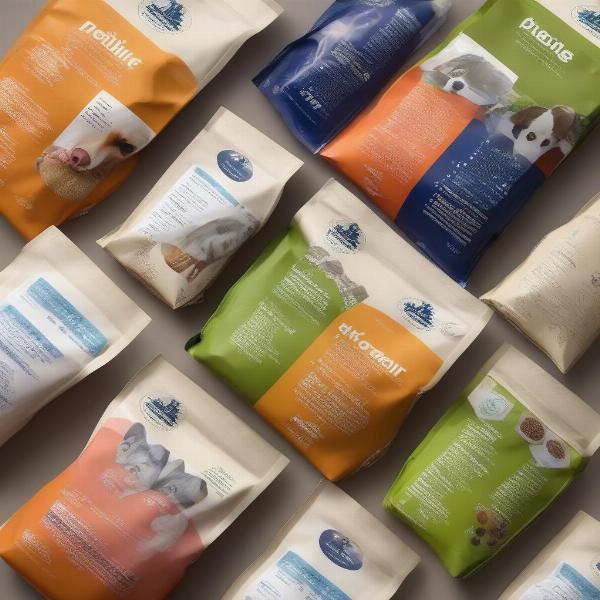Digestive health is crucial for a dog’s overall well-being. Choosing the right wellness digestive health dog food can significantly impact your furry friend’s comfort, energy levels, and even their coat health. This guide explores the importance of digestive health and provides practical tips for selecting the best food to support your dog’s gut.
Understanding Canine Digestive Health
A healthy digestive system efficiently breaks down food, absorbing essential nutrients while eliminating waste. Several factors can influence a dog’s digestive health, including diet, stress, age, and underlying medical conditions. Signs of digestive issues can range from mild discomfort to more serious symptoms.
Common Signs of Digestive Problems in Dogs
- Vomiting
- Diarrhea
- Constipation
- Gas
- Loss of appetite
- Weight loss or gain
- Lethargy
If your dog exhibits any of these signs, consult a veterinarian to rule out any underlying health issues and determine the best course of action.
Choosing the Right Wellness Digestive Health Dog Food
Selecting the appropriate food is essential for maintaining a healthy canine digestive system. Look for dog food formulated with specific ingredients and characteristics that support optimal gut function.
Key Ingredients for Digestive Health
- Fiber: Both soluble and insoluble fiber are crucial. Soluble fiber helps regulate bowel movements, while insoluble fiber adds bulk to the stool, promoting regularity. gelatin for dogs can also be a good source of added fiber.
- Prebiotics and Probiotics: Prebiotics are non-digestible fibers that nourish beneficial bacteria in the gut. Probiotics are live microorganisms that contribute to a healthy gut microbiome.
- Digestible Protein Sources: High-quality protein sources like chicken, fish, or lamb are easier for dogs to digest than some plant-based proteins.
- Healthy Fats: Omega-3 fatty acids have anti-inflammatory properties that can benefit the digestive tract.
What to Avoid in Dog Food
- Artificial Colors, Flavors, and Preservatives: These additives can irritate the digestive system.
- Fillers and Low-Quality Ingredients: These can be difficult to digest and provide little nutritional value.
- Excessive Fat: High-fat diets can lead to pancreatitis and other digestive problems.
 Best Dog Food for Digestive Health Selection
Best Dog Food for Digestive Health Selection
Feeding Tips for Digestive Wellness
- Gradual Food Transitions: Introduce new food slowly to avoid upsetting your dog’s stomach.
- Portion Control: Feed the appropriate amount based on your dog’s age, breed, and activity level. Are you looking for the allintitle:best dry dog food for small dogs? We have a dedicated article for that!
- Fresh Water: Always provide access to clean, fresh water to aid digestion.
- Regular Feeding Schedule: Establish a consistent feeding routine to regulate digestion.
How Can I Tell if My Dog’s Food Is Helping Their Digestion?
Improved stool quality, reduced gas, and increased energy are all signs that your dog’s digestive system is functioning well.
Expert Insights
Dr. Emily Carter, DVM, emphasizes, “A healthy gut is essential for a dog’s overall health. Choosing the right food can significantly improve digestion and reduce the risk of digestive issues.”
Maintaining Long-Term Digestive Health
Regular veterinary check-ups, a balanced diet, and adequate exercise are key to maintaining your dog’s digestive health in the long run. Don’t forget to consider options like pals dog food for maintaining overall health.
Conclusion
Prioritizing your dog’s wellness digestive health is vital for their overall well-being. By choosing the right food and following these guidelines, you can contribute to a happy, healthy digestive system for your beloved companion. For breed-specific advice, check out our guide on the best dog food for australian cattle dogs.
FAQ
- What are the most common signs of digestive problems in dogs? Vomiting, diarrhea, constipation, gas, loss of appetite, weight changes, and lethargy.
- What ingredients should I look for in wellness digestive health dog food? Fiber, prebiotics, probiotics, and digestible protein sources.
- What should I avoid in my dog’s food? Artificial colors, flavors, preservatives, fillers, and excessive fat.
- How can I transition my dog to a new food? Gradually introduce the new food over several days, mixing it with their current food.
- How can I tell if my dog’s food is improving their digestion? Look for improvements in stool quality, reduced gas, and increased energy levels.
- How often should I feed my dog? Most adult dogs thrive on two meals a day.
- What else can I do to support my dog’s digestive health? Provide plenty of fresh water, establish a regular feeding schedule, and ensure adequate exercise.
Learn More About Dog Nutrition and Health
Check out these related articles on ILM Dog for more information:
ILM Dog is your trusted source for expert advice on all aspects of dog care, from breed selection and health to training, nutrition, grooming, and accessories. We offer practical, reliable information to help you provide the best possible care for your canine companion. For more information, contact us at [email protected] or +44 20-3965-8624. Visit ILM Dog for a wealth of resources to support your dog’s health and happiness. dog plus offers more insights.